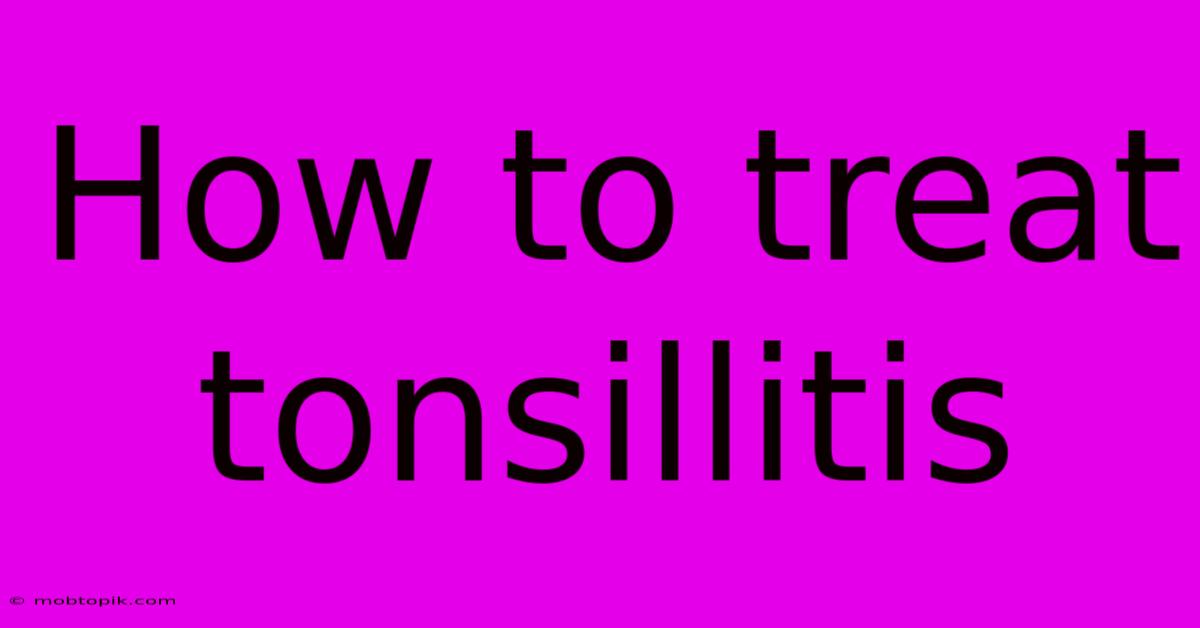How To Treat Tonsillitis

Discover more detailed and exciting information on our website. Click the link below to start your adventure: Visit Best Website mobtopik.com. Don't miss out!
Table of Contents
How to Treat Tonsillitis: A Comprehensive Guide
Tonsillitis, the inflammation of the tonsils, is a common ailment, especially among children and young adults. Characterized by a sore throat, difficulty swallowing, and often accompanied by fever and swollen glands, it can significantly impact your daily life. While most cases are caused by viral infections and resolve on their own, understanding how to treat tonsillitis effectively is crucial for managing symptoms and preventing complications. This comprehensive guide will delve into various treatment options, from home remedies to medical interventions, empowering you to navigate this condition with confidence.
Understanding Tonsillitis: Causes and Symptoms
Before diving into treatment, let's clarify the nature of tonsillitis. Your tonsils, located at the back of your throat, are part of your body's immune system, fighting off infections. However, they can become inflamed due to:
- Viral Infections: The most common cause, typically caused by viruses like the common cold virus, influenza, or Epstein-Barr virus (mononucleosis).
- Bacterial Infections: Less frequent but potentially more serious, often caused by bacteria like Streptococcus pyogenes (Group A Streptococcus), leading to strep throat.
- Other Factors: Allergies, irritants, and even fungal infections can contribute to tonsillitis.
Recognizing the symptoms is key to seeking appropriate treatment:
- Sore Throat: This is the hallmark symptom, often feeling scratchy, painful, or burning.
- Difficulty Swallowing (Dysphagia): Pain and discomfort make swallowing liquids and solids challenging.
- Fever: A common sign of infection, particularly with bacterial tonsillitis.
- Swollen Tonsils: Your tonsils may appear enlarged, red, and possibly coated with white or yellow patches (pus).
- Swollen Lymph Nodes (Lymphadenopathy): The lymph nodes in your neck may become swollen and tender to the touch.
- Headache: Pain in the head can accompany the overall discomfort.
- Body Aches: General muscle aches and fatigue are common.
Treating Tonsillitis: A Multifaceted Approach
The approach to treating tonsillitis depends on the underlying cause and the severity of symptoms. Let's explore various treatment strategies:
1. Home Remedies for Symptom Relief:
For many cases of viral tonsillitis, home remedies can significantly alleviate discomfort:
- Rest: Adequate rest allows your body to fight off the infection more effectively.
- Hydration: Drinking plenty of fluids, such as water, clear broths, and warm herbal teas, helps soothe the throat and prevents dehydration. Avoid acidic juices.
- Salt Water Gargles: Gargling with warm salt water (1/4 to 1/2 teaspoon of salt in 8 ounces of warm water) can help reduce inflammation and pain.
- Humidification: A humidifier adds moisture to the air, easing throat dryness and irritation.
- Over-the-Counter Pain Relievers: Acetaminophen (Tylenol) or ibuprofen (Advil, Motrin) can help reduce fever and pain. Always follow the recommended dosage.
- Throat Lozenges or Sprays: These can provide temporary relief from throat soreness. Look for options containing menthol or lidocaine.
- Honey: Honey has natural antibacterial and soothing properties, and a spoonful can ease throat discomfort.
2. Medical Treatment for Bacterial Tonsillitis:
If your tonsillitis is caused by bacteria, like Streptococcus pyogenes (strep throat), your doctor will likely prescribe antibiotics. Never self-treat bacterial tonsillitis. Untreated strep throat can lead to serious complications, such as rheumatic fever and kidney inflammation.
3. When to Seek Medical Attention:
While many cases of tonsillitis resolve on their own, certain situations warrant immediate medical attention:
- High Fever (over 101°F or 38.3°C): This suggests a more severe infection.
- Difficulty Breathing: If you experience difficulty breathing or shortness of breath, seek immediate medical help.
- Severe Sore Throat: An excruciating sore throat that makes swallowing extremely difficult requires prompt medical attention.
- Dehydration: Signs of dehydration, such as decreased urination, dry mouth, and dizziness, necessitate immediate medical care.
- Persistent Symptoms: If your symptoms don't improve after a week of home treatment, consult a doctor.
4. Tonsillectomy: A Surgical Option
In some cases, particularly with recurrent tonsillitis, a tonsillectomy (surgical removal of the tonsils) may be recommended. This is usually considered as a last resort, after other treatment options have been exhausted. Your doctor will assess your individual situation to determine if a tonsillectomy is necessary.
Preventing Tonsillitis: Proactive Measures
Preventing tonsillitis involves practicing good hygiene and boosting your immune system:
- Handwashing: Regular and thorough handwashing is crucial in preventing the spread of infection.
- Avoid Sharing Utensils and Drinks: This helps prevent the transmission of viruses and bacteria.
- Healthy Lifestyle: A balanced diet, regular exercise, and adequate sleep support a strong immune system.
- Vaccination: Getting vaccinated against influenza and other respiratory viruses can reduce your risk of tonsillitis.
Conclusion: Taking Control of Your Tonsillitis
Tonsillitis can be a painful and disruptive condition, but with appropriate treatment and preventative measures, you can effectively manage symptoms and minimize its impact. Remember to consult a doctor for diagnosis and treatment, particularly if you suspect bacterial tonsillitis or experience severe symptoms. By understanding the various treatment options and taking proactive steps to prevent infection, you can maintain your overall health and well-being. This comprehensive guide provides you with the knowledge to navigate tonsillitis effectively and confidently. Prioritizing rest, hydration, and seeking medical attention when needed are crucial steps in recovery.

Thank you for visiting our website wich cover about How To Treat Tonsillitis. We hope the information provided has been useful to you. Feel free to contact us if you have any questions or need further assistance. See you next time and dont miss to bookmark.
Also read the following articles
| Article Title | Date |
|---|---|
| Trt Spor Rangers Nice Mac Oezeti | Nov 29, 2024 |
| 29 | Nov 29, 2024 |
| How To Treat Cold | Nov 29, 2024 |
| Nice 1 4 Rangers Mac Oezeti Trt Spor | Nov 29, 2024 |
| How To Treat Shingles | Nov 29, 2024 |
